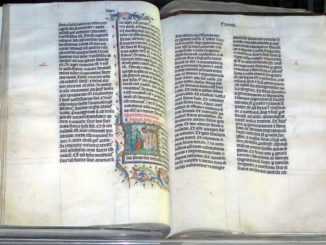After reading DJM’s fascinating article on words and phrases in the English language that originate from the Bard of Avon it set me wondering on the phrases and sayings we use that have their origin in the Bible. The Bible in English is, in British history, a story of great courage and sacrifice, of conspiracy, smuggling, torture and execution as “The Powers That Be” tried in vain to prevent the Bible in English becoming available to anyone, let alone the masses. Eventually, in 1539, a complete translation of the Bible in English, The Great Bible, was authorised by Henry VIII to be read in churches throughout his kingdom. Understandably, the Bible has had a profound affect on the English language and there are many phrases and sayings that have their origin in Holy Writ. I have found some 250 phrases that have been and many still are in common parlance. Far too many for one article so I’ve chosen six for this my first dabble in writing articles for GP. Some are word for word phrases others are paraphrases and others based on or inspired by a Biblical quote or passage. Perhaps it may become a little series.

Public Domain
1. The Powers That Be
This phrase is, of course, well known and used by Puffins but how many knew that it’s origin is from the Bible? It’s first appearance in print was in 1526 in Tyndale’s Bible – William Tyndale was thereby defying TPTB by translating the phrase in to English (along with the rest of the New Testament of course). It comes from the letter of St. Paul to the Romans
Romans chapter 13 verse 1
“Let every soul be subject unto the higher powers. For there is no power but of God: the powers that be are ordained of God.”
Perhaps a little word of explanation is called for. There were some extremist Christians and Jews at the time of St. Paul who recognised no king but God and, for example, refused to pay taxes or take part in civil duties.
2. Pearls Before Swine
Long ago when I was a young teacher in secondary education I had the misfortune to be timetabled to teach class 4X (a group of 15 yr old boys excluded from normal lessons) twice a week. One of the more senior members of staff rather aptly, I thought, described teaching this class as “casting pearls before real swine”. More up to date we probaly all feel a bit like “casting pearls before swine” when trying to enlighten Normies with some truth bombs. The saying comes from the words of the Saviour in the ‘Sermon on the Mount’.
Matthew’s Gospel chapter 7 verse 6
“Give not that which is holy unto the dogs, neither cast ye your pearls before swine, lest they trample them under their feet, and turn again and rend you.”
3. The Apple Of His Eye
Someone who is loved and cherished very much is often described as being the apple of someone’s eye. The “apple” of the eye is the pupil and therefore, the central object of one’s sight or that which one is looking at directly, is in the apple of the eye. The original Hebrew expression literally means “little man of the eye” and refers to the tiny reflection of yourself you can see in someone’s pupil when they are looking directly at you. You are being watched and focused on so carefully by the person you are literally in the centre of their eye. Shakespere uses the phrase in “A Midsummer Night’s Dream”. In the 14th Century John Wycliffe translated the Bible in to English and uses the phrase in Pslam 17. The King James Bible of 1611 has five occurances. For example:
Psalm 17 verse 8
“Keep me as the apple of the eye, hide me under the shadow of thy wings”
Deuteronomy chapter 32 verse 10
“He found him in a desert land, and in the waste howling wilderness; he led him about, he instructed him, he kept him as the apple of his eye”
Proverbs chapter 7 verse 2
“Keep my commandments, and live; and my law as the apple of thine eye.”
4. A Scapegoat
The Daphne Du Maurier novel “The Scapegoat” is one of her few novels written with a male narrator. Adapted for film in 1959 starring Alec Guiness and again in 2012 starring Matthew Rhys (this 2012 version, available on Netflix, radically alters some of the characters and the story in order to push an agenda). The story centres around an Englishman who is a disillusioned university lecturer visiting France where he meets a French count. They find they are identical to one another and the Count “persuades” the Englishman to take his place. The drama unfolds within the Count’s family as the protagonist uncovers deep and dark family secrets.

William Holman Hunt, Public domain, via Wikimedia Commons
(Pic2: William Holmun Hunt – The Scapegoat)
The original phrase comes from a particular ceremony on the Day of Atonement. Two male goats would be brought to the High Priest at the door of the temple. The High Priest would then cast lots to choose which goat would be sacrificed and which would be the Scapegoat. Placing his hands on the Scapegoat the High Priest would then confess over it all the sins of the nation and this goat would take the blame for all these misdeeds. This Scapegoat was then led out of Jerusalem. As it passed by people would spit at it, curse it or throw stones at it. Once out of the city it’s taken far out in to the wilderness and released. The idea being that the Scapegoat has carried away all the blame for the sins of the people.
Levitcus chapter 16 verse 10
“But the goat, on which the lot fell to be the scapegoat, shall be presented alive before the Lord, to make an atonement with him, and to let him go for a scapegoat into the wilderness.”
5. Nimrod
Not a saying as such but a name which Puffin’s will, no doubt, be aware of. The surveilance and hunter aircraft, the Hawker Siddely Nimrod, for example, or the sublime ninth variation from Elgar’s ‘Enigma Variations’. The Biblical Nimrod was one of the descendants of Ham (Shem, Ham and Jepheth, you will recall, were the sons of Noah). Associated by some Biblical researchers with being the leader of a One World Government at the time of the Tower of Babel and is believed to be also known as Gilgamesh. Jewish tradition says that he was slain by Esau, the grandson of Abraham and brother of Jacob. As far as the Bible itself is concerned he merits only two verses.
Genesis chapter 10 verses 8 and 9
“And Cush begat Nimrod: he began to be a mighty one in the earth.
He was a mighty hunter before the Lord: wherefore it is said, Even as Nimrod the mighty hunter before the Lord.”

Public Domain
6. The Blind Leading The Blind
This has become an almost universal trope describing the uninformed and incompetant leading the equally uniformed and incompetant. The image conceived has its comic attributes and as such this concept does appear in no small number of ways. For example: In one episode of ‘Star Trek – The Next Generation’ Geordi is seen teaching Data how to paint. Riker comments on the irony of a blind man teaching art to an emotionless android. From ‘The Hitchhiker’s Guide To The Galaxy’ – “there have been some terrible, terrible accusations that the Guide itself may be an example as it is notoriously unreliable. However, The Guide is definative, reality is sometimes in error.” Again in ‘Pirates of the Caribbean: On Stranger Tides’ Blackbeard and his crew follow Jack Sparrow believing he knows the way to the Fountain of Youth when, all the while the audience knows he has no knowledge of its location at all. To continue the trope it is tempting to think of this as an apt description of the House of Goons but I can’t help thinking the leaders of the LibLabCons there are not blind at all, but know perfectly well what they are doing. Those who continue to vote for the Uniparty however… The saying comes from The Saviour’s description of, not the political leaders, but the religious leaders of the time, the Pharisees.
Matthew chapter 15 verse 14
“Let them alone: they be blind leaders of the blind. And if the blind lead the blind, both shall fall into the ditch.”
7. The Truth Will Set You Free
Americans don’t do irony. Either that or TPTB like to gloat over those they see as their inferiors. When Allen Dulles was Director of the CIA (1953 to 1961) he included this quote in a speech he gave at the opening of the Original Headquarters Building and insisted it be carved in stone in the lobby to the building. In 1981 the then Director of the CIA, William J. Casey, said this “We’ll know our disinformation program is complete when everything the American public believes is false.”
This saying, however, comes from the Lord Jesus Christ. Speaking to His disciples about the difference between His teaching and the teaching by the religious leaders of the day and how, if they would believe and obey His teaching, it would lead them to be free from the Law of Moses and habitual sinfulness.
John chapter 8 verse 32
“And ye shall know the truth, and the truth shall make you free”
8. By The Skin Of My Teeth
Colin Downes, fighter pilot with the RAF in WW2 and USAF in Korea, titled his memoirs ‘By The Skin of My Teeth’ where he draws on a very rich vein of his experiences and narrow escapes as well as the operational capabilities of the aircraft he flew. I suppose this saying could be said to be true of any surviving pilot from WW2. I read recently of one Lancaster bomber pilot who told how he could never understand why bomber air-crews were constantly being moved around to different squadrens. It was only when a TV programme about bomber command revealed air-crews were continuously moved around to hide the terrible attrition rate that the penny dropped. He said that he then realized how he must have survived ‘by the skin of my teeth’.
The saying comes from the book of Job, probably one of the oldest books of the Bible, and is a direct translation of the Hebrew, so the saying is very, very old indeed.
Job chapter 19 verse 20
“My bone cleaveth to my skin and to my flesh, and I am escaped by the skin of my teeth.”
9. Being Beside Yourself
The ancients believed that under a high emotional state, whether of joy, sorrow, or under extreme stress, the soul and body could be split and the soul leave the body. When this happened a person was ‘beside himself’. A similar expression would be ‘out of his mind’.
The phrase is used to describe such a state three times in the New Testament. Once about the Saviour, once about St. Paul and the third occasion by St. Paul concerning himself.
Mark chapter 3 verse 21
“And when his friends heard of it, they went out to lay hold on him: for they said, He is beside himself.”
Acts chapter 26 verse 24
“And as he thus spake for himself, Festus said with a loud voice, Paul, thou art beside thyself; much learning doth make thee mad.”
2 Corinthians chapter 5 verse 13
“For whether we be beside ourselves, it is to God: or whether we be sober, it is for your cause.”
10. The Writing’s On The Wall
11. Knees Knocking In Fear
12. Your Number’s Up
13. Weighed In The Balance And Found Wanting/Found Wanting
All four expressions come from or are inspired by the same Biblical narrative in the book of Daniel chapter 5 and frequently titled ‘Belshazzar’s Feast’. For many years historians denied the existance of Belshazzar. Every historian worth his salt knew that the king of Babylon at the time of it’s fall to the Persians was Nabonidas. Then sometime in the 19th century the ‘Nabonidus Cylander’ was discovered (now on display in the British Museum) and its translation revealed that Belshazzar was the eldest son of Nabonidas and was left as co-regent in Babylon while Nabonidas was on campaign at the oasis of Teima.
During the seige of Babylon by the Persians Belshazzar is so confident of the impregnability of Babylon that he calls a feast for all the cities nobles. He had good reason to feel so secure. The outer walls of Babylon were 17 miles long, 22 feet thick and 90 feet high. In addition the walls had guard towers 100 feet high and the city gates were made of bronze so they couldn’t be burned or broken by battering rams. During the feast he commits a great sacrilidge by using the cups and pitchers looted from the Jewish temple in Jerusalem to toast and praise “the gods of gold, and of silver, of brass, of iron, of wood and of stone.” It’s at this point Belshazzar and his guests see “the writing’s on the wall” informing Belshazzar of his imminent demise:
Daniel chapter 5 verse 5
“In the same hour came forth fingers of a man’s hand, and wrote over against the candlestick upon the plaister of the wall of the king’s palace: and the king saw the part of the hand that wrote.”
Belshazzar is immediately so afraid “his knees were knocking in fear”.
Daniel chapter 5 verse 6
“Then the king’s countenance was changed, and his thoughts troubled him, so that the joints of his loins were loosed, and his knees smote one against another.”

Public Domain
No one could read the writing let alone understand the words which were written on the wall. Possibly because it was written in Hebrew with the original Hebrew alphabet which would have been a language and alphabet unknown to Belshazzar, his nobles and all his advisors. He is so disturbed he offers great riches and reward even to being promoted to be the third in the kingdom. Why the third in the kingdom? The greatest reward a king usually bestowed was to make someone second in the kingdom, answerable only to the king himself. Well, of course, the Nabonidas Cylendar informs us that Belshazzar is the second in the kingdom so the third place is the highest he can offer. Even with such a reward no one is able to decipher the message until the news of it reaches the queen who remembers there’s an old wise man named Daniel who is reputed to be able to reveal mysteries. Whereupon Daniel is called for and indeed he does read and interpret “the writing on the wall” but not before telling Belshazzar where he can stick his reward! (I suspect Daniel to be a bit of a Puffin). He then reads the words MENE MENE TEKEL UPHARSIN (numbered, numbered, weighed, divided) and explains it means that God has numbered the days of Belshazzar’s kingdom and his number’s up and he’s been weighed and found wanting:
Daniel chapter 5 verse 26 and 27
“This is the interpretation of the thing:
MENE; God has numbered the day’s of thy kingdom and brought it to an end.
TEKEL; Thou art weighed in the balances, and art found wanting.”
Daniel continues to explain that UPHARSIN means the kingdom will be divided between the Medes and Persians. Later that night Belshazzar was killed, the city gates were opened and Cyrus the Great took possession of Babylon without a fight.
Postscript to Belshazzar’s Feast: According to the historian Josephus, as the now defacto ruler of Babylon, Daniel welcomed Cyrus and showed him this passage in the scroll of the prophet Isaiah written some 150 years previously which, quite succinctly foretold the events which led to his capture of Babylon.
Isaiah 45 verse 1
“Thus saith the LORD to his anointed, to Cyrus, whose right hand I have holden, to subdue nations before him; and I will loose the loins of kings, to open before him the two leaved gates; and the gates shall not be shut;”
© Apocalypse – Now In A Minute 2023



